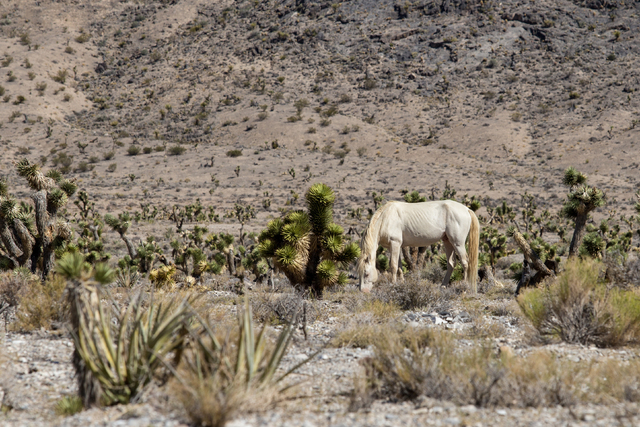BLM’s Nevada boss urges roundup of 4,000 mustangs
RENO — Concerned about continued deterioration of drought-stricken rangeland in Nevada, the Bureau of Land Management’s state director wants to round up 4,000 wild horses in Elko County — more mustangs than were gathered across 10 Western states combined last year.
BLM Nevada Director John Ruhs says it’s unlikely he’ll be able to consider lifting livestock grazing restrictions in the northeast corner of the state without removing the mustangs from four-herd management areas over 600 square miles stretching to near the Utah line.
Ruhs, Gov. Brian Sandoval, livestock interests and state wildlife officials argue the roundups also would benefit the greater sage grouse.
Nevada Agriculture Director Jim Barbee anticipates that without the roundups, anywhere from a 25 percent to a total reduction in grazing will be necessary in some areas, resulting in as much as $1.8 million in damages to Elko County’s economy.
Conservationists say the call for more roundups is a misguided attempt to placate ranchers at the expense of horses and grouse. Cattle do far more damage than mustangs to the range and the imperiled bird, they say.
“The BLM is scapegoating wild horses instead of addressing the true causes of range degradation and threats to sage grouse,” said Suzanne Roy, director of the American Wild Horse Preservation Campaign.
Nevada is home to nearly 28,000 wild horses — more than half of the 47,000 estimated in 10 western states, including Arizona, California, Colorado, Idaho, Montana, New Mexico, Oregon, Utah and Wyoming.
BLM officials argue the range can sustain less than half that many — about 12,000 in Nevada and 26,000 nationally.
Ruhs estimated in an April 13 letter to the agency’s headquarters that it would cost about $4 million to remove about 4,000 animals in Elko County. He said the population of those herds is at five times the appropriate carrying capacity. “Some of the allotments/pastures within the impacted area will need to be closed to livestock grazing in 2016 and into the future to limit further damage to these ecosystems or until appropriate management of the wild horses has taken place,’” he wrote.
Sandoval warned last week if the Interior Department refuses to adequately fund the program, “the state will pursue all legal options to protect our local producers and communities.”
Sen. Dean Heller, R-Nevada, said in a letter to Secretary Sally Jewell that he’s disappointed the BLM has not responded to a request he and others made in November for an update on herds across the West.
“Over the past few years, many ranchers have already taken reductions in their grazing allotments, yet horse populations have only increased, not decreased, over that time,” Heller wrote Friday.
The BLM gathered 7,242 horses nationally in 2012; 4,064 in 2013; 1,689 in 2014; and 3,093 last fiscal year. It removed about 1,000 in Oregon in November, about 125 in southern Nevada in February, 54 in Utah in March, and this summer plans to remove about 535 in Wyoming and 300 in Utah.
But the agency currently plans no large-scale roundups in Nevada — or anywhere else — through the end of September because of budget shortfalls driven largely by the cost of housing more than 45,000 mustangs now in government corrals and pastures at a lifetime cost of $48,000 per animal.
The Nevada Association of Counties, Nevada Farm Bureau and others filed a lawsuit last year to force the government to step up roundups, but a federal judge in Reno dismissed the case.
“Unfortunately, the removal of cattle from areas where horse populations are significantly over (appropriate management levels) does not alleviate the impacts to native species, including sage grouse,” Nevada Cattlemen’s Association President David Stix Jr. said.
WildEarth Guardians wildlife biologist Erik Molvar disagreed. “Suggesting that wild horses are a problem for sage grouse, while ignoring the comparatively massive impacts of cattle and sheep, is a bit like suggesting that the captain of the Titanic should be worried about the ice cubes in his passengers’ cocktails rather than the icebergs floating in the North Atlantic,” he said.
RELATED
Activist chronicles wild horse roundups to guard against mistreatment
Plans to save bistate sage grouse in Nevada gain momentum

















